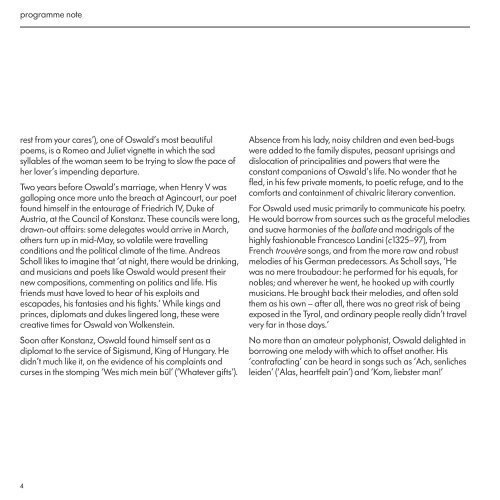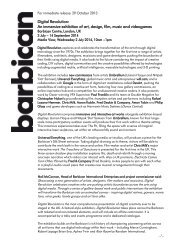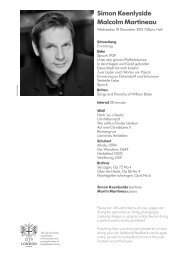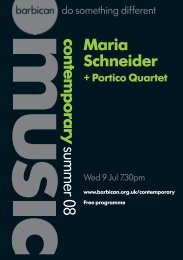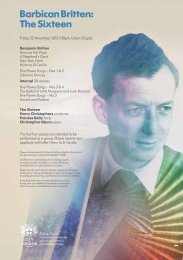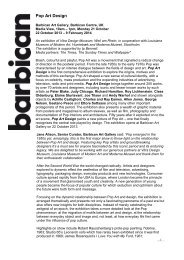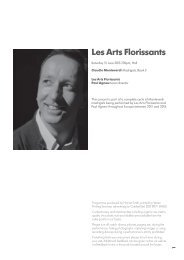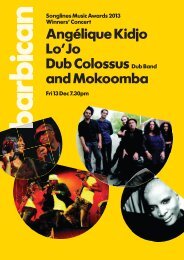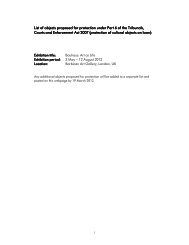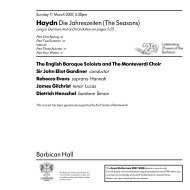Oswald von Wolkenstein - Barbican
Oswald von Wolkenstein - Barbican
Oswald von Wolkenstein - Barbican
Create successful ePaper yourself
Turn your PDF publications into a flip-book with our unique Google optimized e-Paper software.
programme note<br />
rest from your cares’), one of <strong>Oswald</strong>’s most beautiful<br />
poems, is a Romeo and Juliet vignette in which the sad<br />
syllables of the woman seem to be trying to slow the pace of<br />
her lover’s impending departure.<br />
Two years before <strong>Oswald</strong>’s marriage, when Henry V was<br />
galloping once more unto the breach at Agincourt, our poet<br />
found himself in the entourage of Friedrich IV, Duke of<br />
Austria, at the Council of Konstanz. These councils were long,<br />
drawn-out affairs: some delegates would arrive in March,<br />
others turn up in mid-May, so volatile were travelling<br />
conditions and the political climate of the time. Andreas<br />
Scholl likes to imagine that ‘at night, there would be drinking,<br />
and musicians and poets like <strong>Oswald</strong> would present their<br />
new compositions, commenting on politics and life. His<br />
friends must have loved to hear of his exploits and<br />
escapades, his fantasies and his fights.’ While kings and<br />
princes, diplomats and dukes lingered long, these were<br />
creative times for <strong>Oswald</strong> <strong>von</strong> <strong>Wolkenstein</strong>.<br />
Soon after Konstanz, <strong>Oswald</strong> found himself sent as a<br />
diplomat to the service of Sigismund, King of Hungary. He<br />
didn’t much like it, on the evidence of his complaints and<br />
curses in the stomping ‘Wes mich mein bül’ (‘Whatever gifts’).<br />
4<br />
Absence from his lady, noisy children and even bed-bugs<br />
were added to the family disputes, peasant uprisings and<br />
dislocation of principalities and powers that were the<br />
constant companions of <strong>Oswald</strong>’s life. No wonder that he<br />
fled, in his few private moments, to poetic refuge, and to the<br />
comforts and containment of chivalric literary convention.<br />
For <strong>Oswald</strong> used music primarily to communicate his poetry.<br />
He would borrow from sources such as the graceful melodies<br />
and suave harmonies of the ballate and madrigals of the<br />
highly fashionable Francesco Landini (c1325–97), from<br />
French trouvère songs, and from the more raw and robust<br />
melodies of his German predecessors. As Scholl says, ‘He<br />
was no mere troubadour: he performed for his equals, for<br />
nobles; and wherever he went, he hooked up with courtly<br />
musicians. He brought back their melodies, and often sold<br />
them as his own – after all, there was no great risk of being<br />
exposed in the Tyrol, and ordinary people really didn’t travel<br />
very far in those days.’<br />
No more than an amateur polyphonist, <strong>Oswald</strong> delighted in<br />
borrowing one melody with which to offset another. His<br />
‘contrafacting’ can be heard in songs such as ‘Ach, senliches<br />
leiden’ (‘Alas, heartfelt pain’) and ‘Kom, liebster man!’


